MBA603 - New Venture Capital: Risks and Ethical Issues Report
VerifiedAdded on 2022/09/07
|12
|2398
|17
Report
AI Summary
This report analyzes the risks and ethical issues associated with launching and investing in startups. It identifies key risks for entrepreneurs, such as funding risks, and for investors, including principal and dilution risks. The report also explores ethical considerations like social and environmental sustainability, and ethical funding practices. It then highlights the top three risks/ethical issues, providing strategies to mitigate them, such as pre-agreements for funding and protecting investor margins. The report emphasizes the importance of considering both financial and ethical aspects for the success of new ventures. The report is based on the MBA603 course, and the student has discussed the various risks and ethical issues to be considered when launching a start-up and as an investor when investing in a start-up. The report identifies the top three risks and ethical issues and provides examples using various case studies/businesses.

Running head: RISKS AND ETHICAL ISSUES
RISKS AND ETHICAL ISSUES
Name of the Student
Name of the University
Authors note
RISKS AND ETHICAL ISSUES
Name of the Student
Name of the University
Authors note
Paraphrase This Document
Need a fresh take? Get an instant paraphrase of this document with our AI Paraphraser
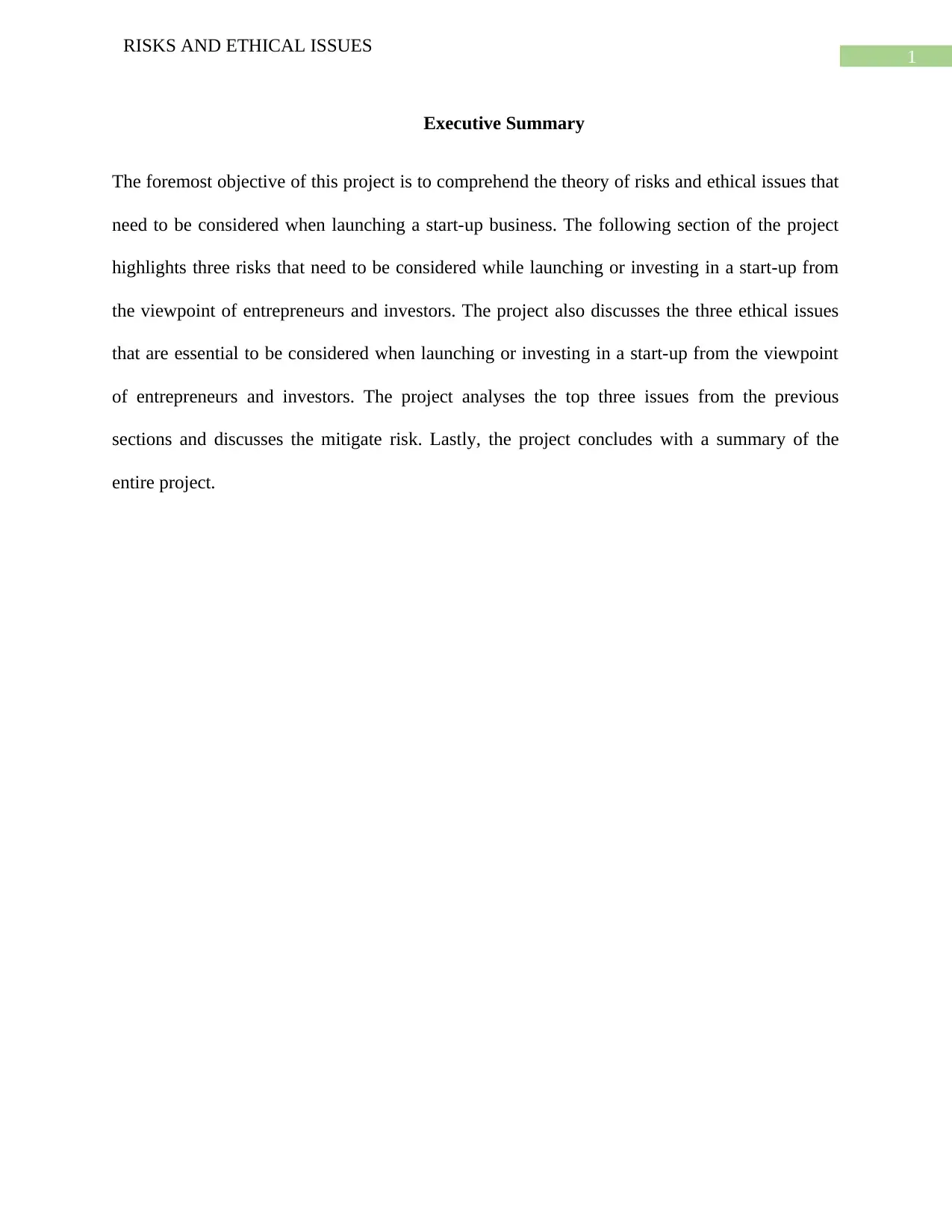
1
RISKS AND ETHICAL ISSUES
Executive Summary
The foremost objective of this project is to comprehend the theory of risks and ethical issues that
need to be considered when launching a start-up business. The following section of the project
highlights three risks that need to be considered while launching or investing in a start-up from
the viewpoint of entrepreneurs and investors. The project also discusses the three ethical issues
that are essential to be considered when launching or investing in a start-up from the viewpoint
of entrepreneurs and investors. The project analyses the top three issues from the previous
sections and discusses the mitigate risk. Lastly, the project concludes with a summary of the
entire project.
RISKS AND ETHICAL ISSUES
Executive Summary
The foremost objective of this project is to comprehend the theory of risks and ethical issues that
need to be considered when launching a start-up business. The following section of the project
highlights three risks that need to be considered while launching or investing in a start-up from
the viewpoint of entrepreneurs and investors. The project also discusses the three ethical issues
that are essential to be considered when launching or investing in a start-up from the viewpoint
of entrepreneurs and investors. The project analyses the top three issues from the previous
sections and discusses the mitigate risk. Lastly, the project concludes with a summary of the
entire project.
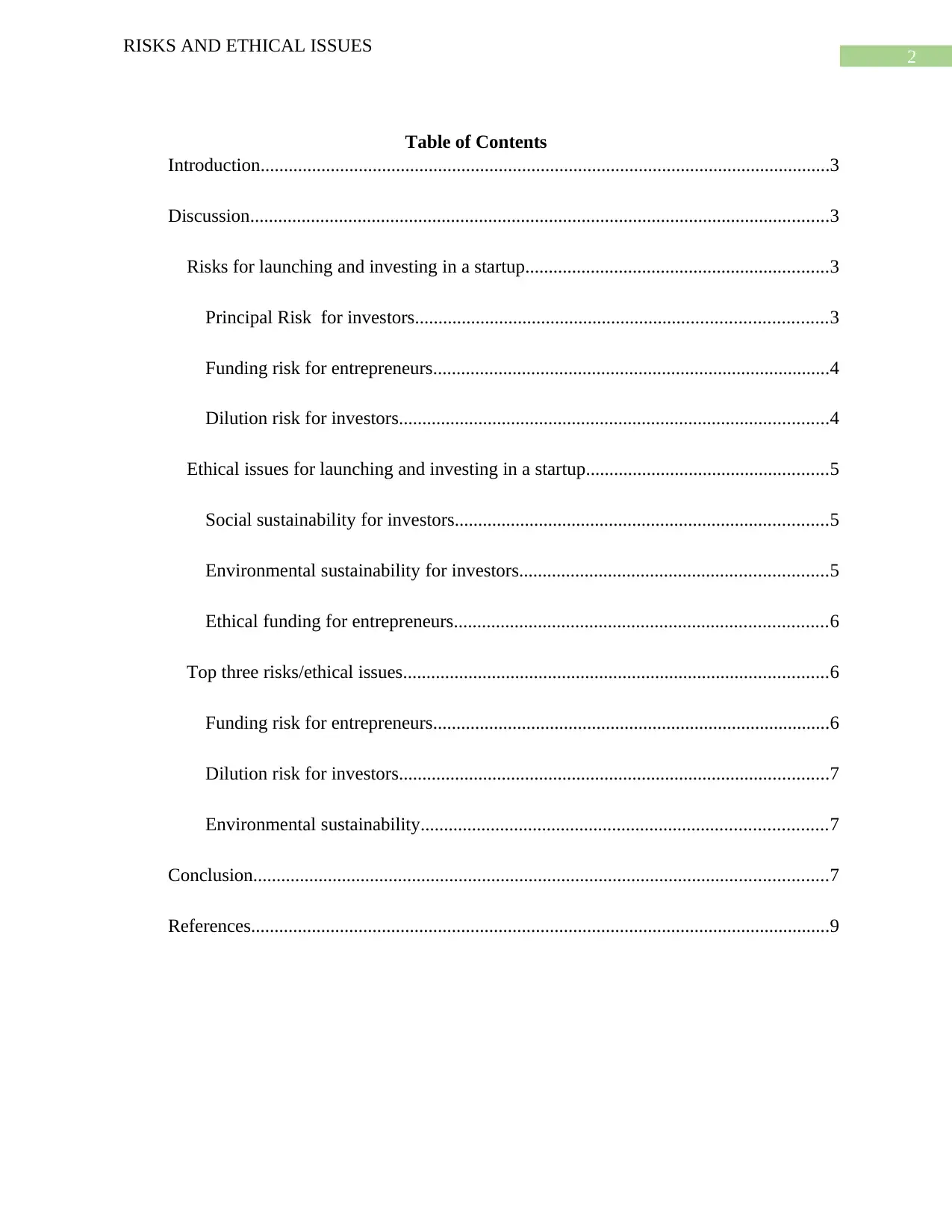
2
RISKS AND ETHICAL ISSUES
Table of Contents
Introduction..........................................................................................................................3
Discussion............................................................................................................................3
Risks for launching and investing in a startup.................................................................3
Principal Risk for investors........................................................................................3
Funding risk for entrepreneurs.....................................................................................4
Dilution risk for investors............................................................................................4
Ethical issues for launching and investing in a startup....................................................5
Social sustainability for investors................................................................................5
Environmental sustainability for investors..................................................................5
Ethical funding for entrepreneurs................................................................................6
Top three risks/ethical issues...........................................................................................6
Funding risk for entrepreneurs.....................................................................................6
Dilution risk for investors............................................................................................7
Environmental sustainability.......................................................................................7
Conclusion...........................................................................................................................7
References............................................................................................................................9
RISKS AND ETHICAL ISSUES
Table of Contents
Introduction..........................................................................................................................3
Discussion............................................................................................................................3
Risks for launching and investing in a startup.................................................................3
Principal Risk for investors........................................................................................3
Funding risk for entrepreneurs.....................................................................................4
Dilution risk for investors............................................................................................4
Ethical issues for launching and investing in a startup....................................................5
Social sustainability for investors................................................................................5
Environmental sustainability for investors..................................................................5
Ethical funding for entrepreneurs................................................................................6
Top three risks/ethical issues...........................................................................................6
Funding risk for entrepreneurs.....................................................................................6
Dilution risk for investors............................................................................................7
Environmental sustainability.......................................................................................7
Conclusion...........................................................................................................................7
References............................................................................................................................9
⊘ This is a preview!⊘
Do you want full access?
Subscribe today to unlock all pages.

Trusted by 1+ million students worldwide
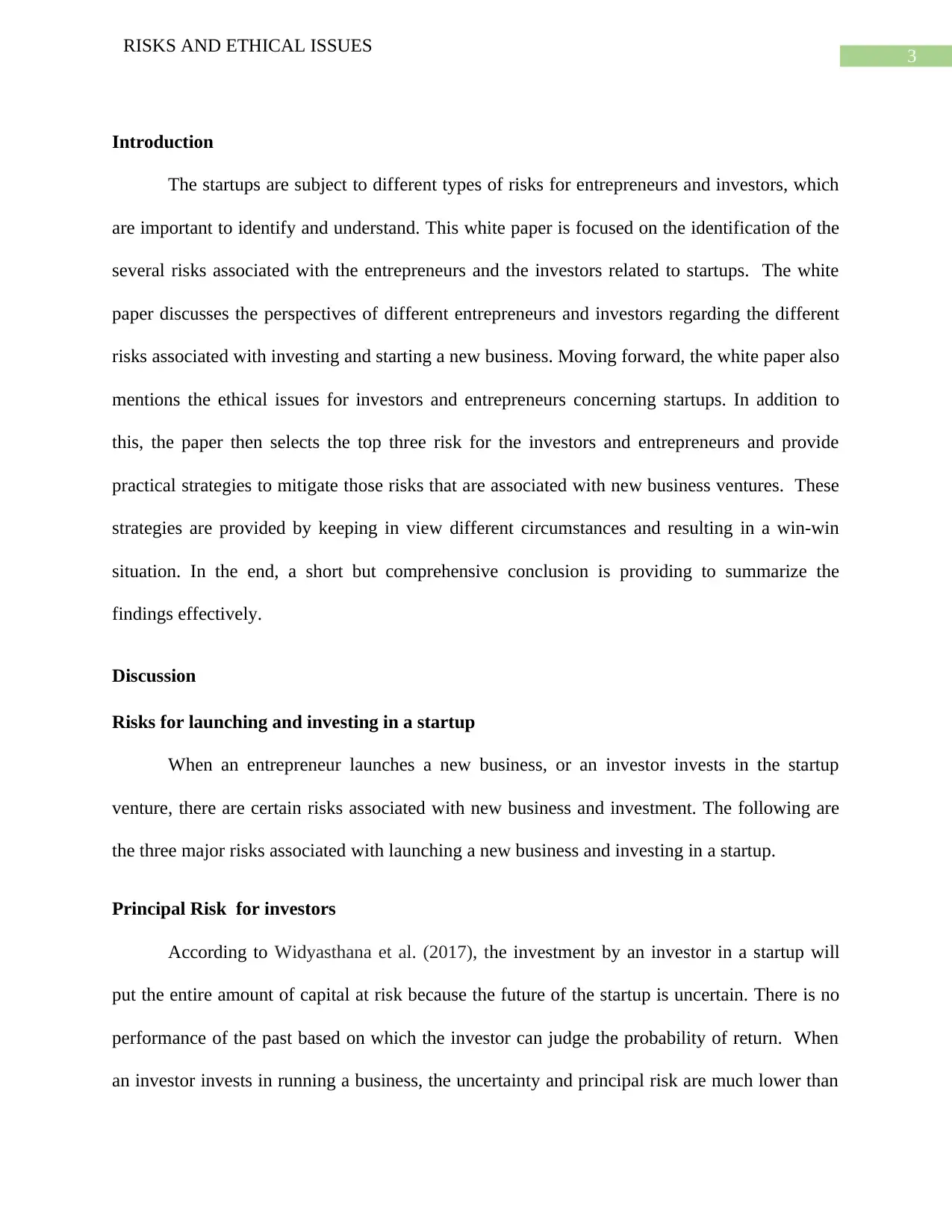
3
RISKS AND ETHICAL ISSUES
Introduction
The startups are subject to different types of risks for entrepreneurs and investors, which
are important to identify and understand. This white paper is focused on the identification of the
several risks associated with the entrepreneurs and the investors related to startups. The white
paper discusses the perspectives of different entrepreneurs and investors regarding the different
risks associated with investing and starting a new business. Moving forward, the white paper also
mentions the ethical issues for investors and entrepreneurs concerning startups. In addition to
this, the paper then selects the top three risk for the investors and entrepreneurs and provide
practical strategies to mitigate those risks that are associated with new business ventures. These
strategies are provided by keeping in view different circumstances and resulting in a win-win
situation. In the end, a short but comprehensive conclusion is providing to summarize the
findings effectively.
Discussion
Risks for launching and investing in a startup
When an entrepreneur launches a new business, or an investor invests in the startup
venture, there are certain risks associated with new business and investment. The following are
the three major risks associated with launching a new business and investing in a startup.
Principal Risk for investors
According to Widyasthana et al. (2017), the investment by an investor in a startup will
put the entire amount of capital at risk because the future of the startup is uncertain. There is no
performance of the past based on which the investor can judge the probability of return. When
an investor invests in running a business, the uncertainty and principal risk are much lower than
RISKS AND ETHICAL ISSUES
Introduction
The startups are subject to different types of risks for entrepreneurs and investors, which
are important to identify and understand. This white paper is focused on the identification of the
several risks associated with the entrepreneurs and the investors related to startups. The white
paper discusses the perspectives of different entrepreneurs and investors regarding the different
risks associated with investing and starting a new business. Moving forward, the white paper also
mentions the ethical issues for investors and entrepreneurs concerning startups. In addition to
this, the paper then selects the top three risk for the investors and entrepreneurs and provide
practical strategies to mitigate those risks that are associated with new business ventures. These
strategies are provided by keeping in view different circumstances and resulting in a win-win
situation. In the end, a short but comprehensive conclusion is providing to summarize the
findings effectively.
Discussion
Risks for launching and investing in a startup
When an entrepreneur launches a new business, or an investor invests in the startup
venture, there are certain risks associated with new business and investment. The following are
the three major risks associated with launching a new business and investing in a startup.
Principal Risk for investors
According to Widyasthana et al. (2017), the investment by an investor in a startup will
put the entire amount of capital at risk because the future of the startup is uncertain. There is no
performance of the past based on which the investor can judge the probability of return. When
an investor invests in running a business, the uncertainty and principal risk are much lower than
Paraphrase This Document
Need a fresh take? Get an instant paraphrase of this document with our AI Paraphraser
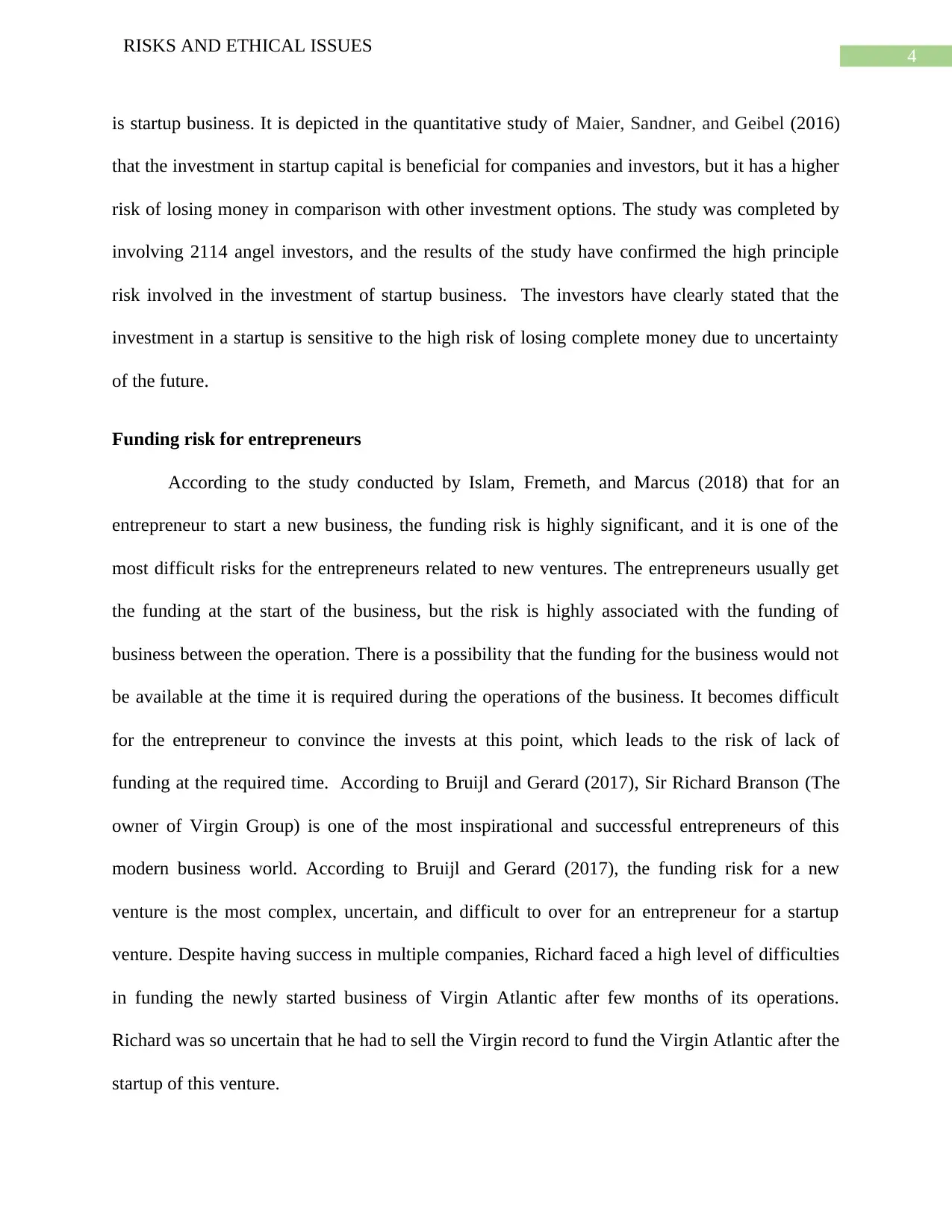
4
RISKS AND ETHICAL ISSUES
is startup business. It is depicted in the quantitative study of Maier, Sandner, and Geibel (2016)
that the investment in startup capital is beneficial for companies and investors, but it has a higher
risk of losing money in comparison with other investment options. The study was completed by
involving 2114 angel investors, and the results of the study have confirmed the high principle
risk involved in the investment of startup business. The investors have clearly stated that the
investment in a startup is sensitive to the high risk of losing complete money due to uncertainty
of the future.
Funding risk for entrepreneurs
According to the study conducted by Islam, Fremeth, and Marcus (2018) that for an
entrepreneur to start a new business, the funding risk is highly significant, and it is one of the
most difficult risks for the entrepreneurs related to new ventures. The entrepreneurs usually get
the funding at the start of the business, but the risk is highly associated with the funding of
business between the operation. There is a possibility that the funding for the business would not
be available at the time it is required during the operations of the business. It becomes difficult
for the entrepreneur to convince the invests at this point, which leads to the risk of lack of
funding at the required time. According to Bruijl and Gerard (2017), Sir Richard Branson (The
owner of Virgin Group) is one of the most inspirational and successful entrepreneurs of this
modern business world. According to Bruijl and Gerard (2017), the funding risk for a new
venture is the most complex, uncertain, and difficult to over for an entrepreneur for a startup
venture. Despite having success in multiple companies, Richard faced a high level of difficulties
in funding the newly started business of Virgin Atlantic after few months of its operations.
Richard was so uncertain that he had to sell the Virgin record to fund the Virgin Atlantic after the
startup of this venture.
RISKS AND ETHICAL ISSUES
is startup business. It is depicted in the quantitative study of Maier, Sandner, and Geibel (2016)
that the investment in startup capital is beneficial for companies and investors, but it has a higher
risk of losing money in comparison with other investment options. The study was completed by
involving 2114 angel investors, and the results of the study have confirmed the high principle
risk involved in the investment of startup business. The investors have clearly stated that the
investment in a startup is sensitive to the high risk of losing complete money due to uncertainty
of the future.
Funding risk for entrepreneurs
According to the study conducted by Islam, Fremeth, and Marcus (2018) that for an
entrepreneur to start a new business, the funding risk is highly significant, and it is one of the
most difficult risks for the entrepreneurs related to new ventures. The entrepreneurs usually get
the funding at the start of the business, but the risk is highly associated with the funding of
business between the operation. There is a possibility that the funding for the business would not
be available at the time it is required during the operations of the business. It becomes difficult
for the entrepreneur to convince the invests at this point, which leads to the risk of lack of
funding at the required time. According to Bruijl and Gerard (2017), Sir Richard Branson (The
owner of Virgin Group) is one of the most inspirational and successful entrepreneurs of this
modern business world. According to Bruijl and Gerard (2017), the funding risk for a new
venture is the most complex, uncertain, and difficult to over for an entrepreneur for a startup
venture. Despite having success in multiple companies, Richard faced a high level of difficulties
in funding the newly started business of Virgin Atlantic after few months of its operations.
Richard was so uncertain that he had to sell the Virgin record to fund the Virgin Atlantic after the
startup of this venture.
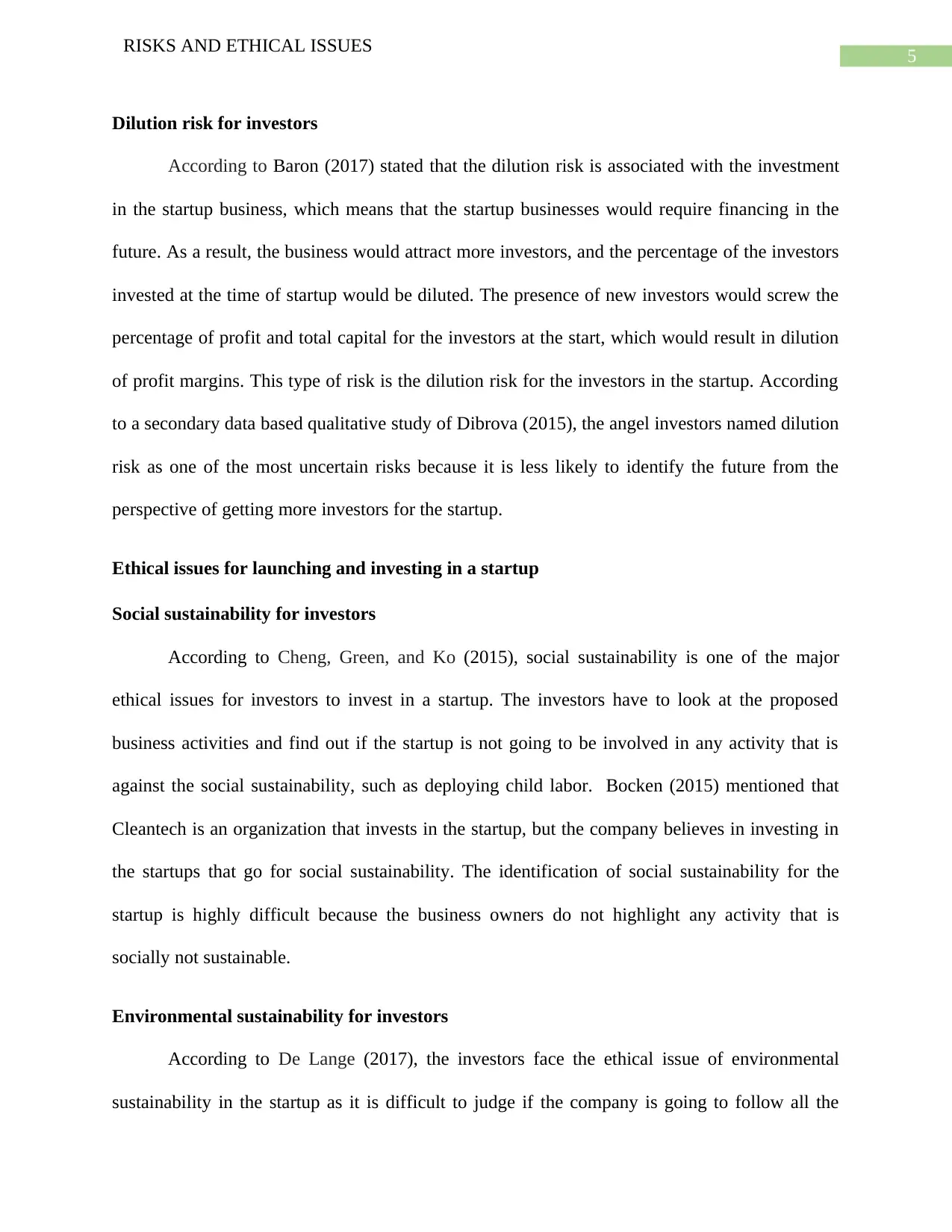
5
RISKS AND ETHICAL ISSUES
Dilution risk for investors
According to Baron (2017) stated that the dilution risk is associated with the investment
in the startup business, which means that the startup businesses would require financing in the
future. As a result, the business would attract more investors, and the percentage of the investors
invested at the time of startup would be diluted. The presence of new investors would screw the
percentage of profit and total capital for the investors at the start, which would result in dilution
of profit margins. This type of risk is the dilution risk for the investors in the startup. According
to a secondary data based qualitative study of Dibrova (2015), the angel investors named dilution
risk as one of the most uncertain risks because it is less likely to identify the future from the
perspective of getting more investors for the startup.
Ethical issues for launching and investing in a startup
Social sustainability for investors
According to Cheng, Green, and Ko (2015), social sustainability is one of the major
ethical issues for investors to invest in a startup. The investors have to look at the proposed
business activities and find out if the startup is not going to be involved in any activity that is
against the social sustainability, such as deploying child labor. Bocken (2015) mentioned that
Cleantech is an organization that invests in the startup, but the company believes in investing in
the startups that go for social sustainability. The identification of social sustainability for the
startup is highly difficult because the business owners do not highlight any activity that is
socially not sustainable.
Environmental sustainability for investors
According to De Lange (2017), the investors face the ethical issue of environmental
sustainability in the startup as it is difficult to judge if the company is going to follow all the
RISKS AND ETHICAL ISSUES
Dilution risk for investors
According to Baron (2017) stated that the dilution risk is associated with the investment
in the startup business, which means that the startup businesses would require financing in the
future. As a result, the business would attract more investors, and the percentage of the investors
invested at the time of startup would be diluted. The presence of new investors would screw the
percentage of profit and total capital for the investors at the start, which would result in dilution
of profit margins. This type of risk is the dilution risk for the investors in the startup. According
to a secondary data based qualitative study of Dibrova (2015), the angel investors named dilution
risk as one of the most uncertain risks because it is less likely to identify the future from the
perspective of getting more investors for the startup.
Ethical issues for launching and investing in a startup
Social sustainability for investors
According to Cheng, Green, and Ko (2015), social sustainability is one of the major
ethical issues for investors to invest in a startup. The investors have to look at the proposed
business activities and find out if the startup is not going to be involved in any activity that is
against the social sustainability, such as deploying child labor. Bocken (2015) mentioned that
Cleantech is an organization that invests in the startup, but the company believes in investing in
the startups that go for social sustainability. The identification of social sustainability for the
startup is highly difficult because the business owners do not highlight any activity that is
socially not sustainable.
Environmental sustainability for investors
According to De Lange (2017), the investors face the ethical issue of environmental
sustainability in the startup as it is difficult to judge if the company is going to follow all the
⊘ This is a preview!⊘
Do you want full access?
Subscribe today to unlock all pages.

Trusted by 1+ million students worldwide
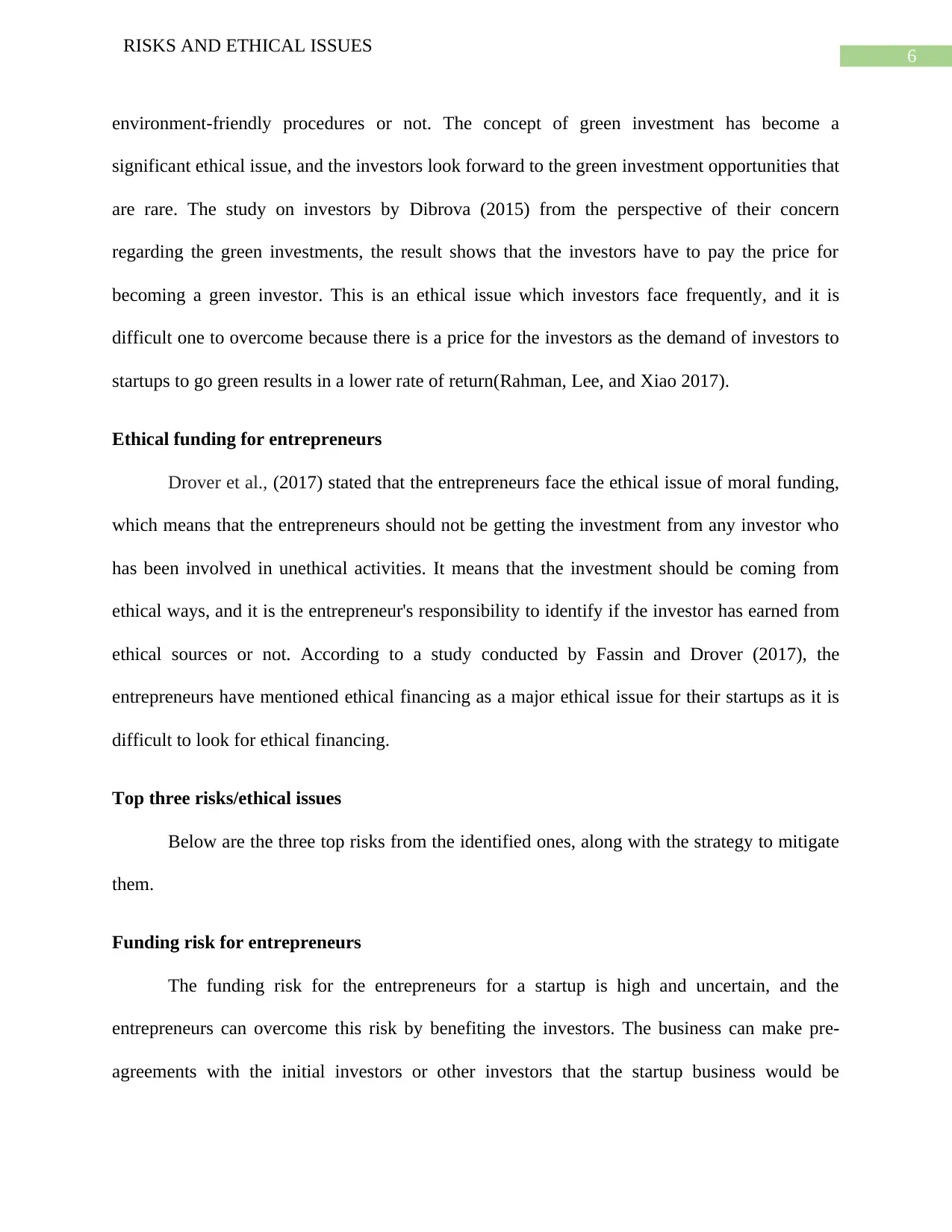
6
RISKS AND ETHICAL ISSUES
environment-friendly procedures or not. The concept of green investment has become a
significant ethical issue, and the investors look forward to the green investment opportunities that
are rare. The study on investors by Dibrova (2015) from the perspective of their concern
regarding the green investments, the result shows that the investors have to pay the price for
becoming a green investor. This is an ethical issue which investors face frequently, and it is
difficult one to overcome because there is a price for the investors as the demand of investors to
startups to go green results in a lower rate of return(Rahman, Lee, and Xiao 2017).
Ethical funding for entrepreneurs
Drover et al., (2017) stated that the entrepreneurs face the ethical issue of moral funding,
which means that the entrepreneurs should not be getting the investment from any investor who
has been involved in unethical activities. It means that the investment should be coming from
ethical ways, and it is the entrepreneur's responsibility to identify if the investor has earned from
ethical sources or not. According to a study conducted by Fassin and Drover (2017), the
entrepreneurs have mentioned ethical financing as a major ethical issue for their startups as it is
difficult to look for ethical financing.
Top three risks/ethical issues
Below are the three top risks from the identified ones, along with the strategy to mitigate
them.
Funding risk for entrepreneurs
The funding risk for the entrepreneurs for a startup is high and uncertain, and the
entrepreneurs can overcome this risk by benefiting the investors. The business can make pre-
agreements with the initial investors or other investors that the startup business would be
RISKS AND ETHICAL ISSUES
environment-friendly procedures or not. The concept of green investment has become a
significant ethical issue, and the investors look forward to the green investment opportunities that
are rare. The study on investors by Dibrova (2015) from the perspective of their concern
regarding the green investments, the result shows that the investors have to pay the price for
becoming a green investor. This is an ethical issue which investors face frequently, and it is
difficult one to overcome because there is a price for the investors as the demand of investors to
startups to go green results in a lower rate of return(Rahman, Lee, and Xiao 2017).
Ethical funding for entrepreneurs
Drover et al., (2017) stated that the entrepreneurs face the ethical issue of moral funding,
which means that the entrepreneurs should not be getting the investment from any investor who
has been involved in unethical activities. It means that the investment should be coming from
ethical ways, and it is the entrepreneur's responsibility to identify if the investor has earned from
ethical sources or not. According to a study conducted by Fassin and Drover (2017), the
entrepreneurs have mentioned ethical financing as a major ethical issue for their startups as it is
difficult to look for ethical financing.
Top three risks/ethical issues
Below are the three top risks from the identified ones, along with the strategy to mitigate
them.
Funding risk for entrepreneurs
The funding risk for the entrepreneurs for a startup is high and uncertain, and the
entrepreneurs can overcome this risk by benefiting the investors. The business can make pre-
agreements with the initial investors or other investors that the startup business would be
Paraphrase This Document
Need a fresh take? Get an instant paraphrase of this document with our AI Paraphraser
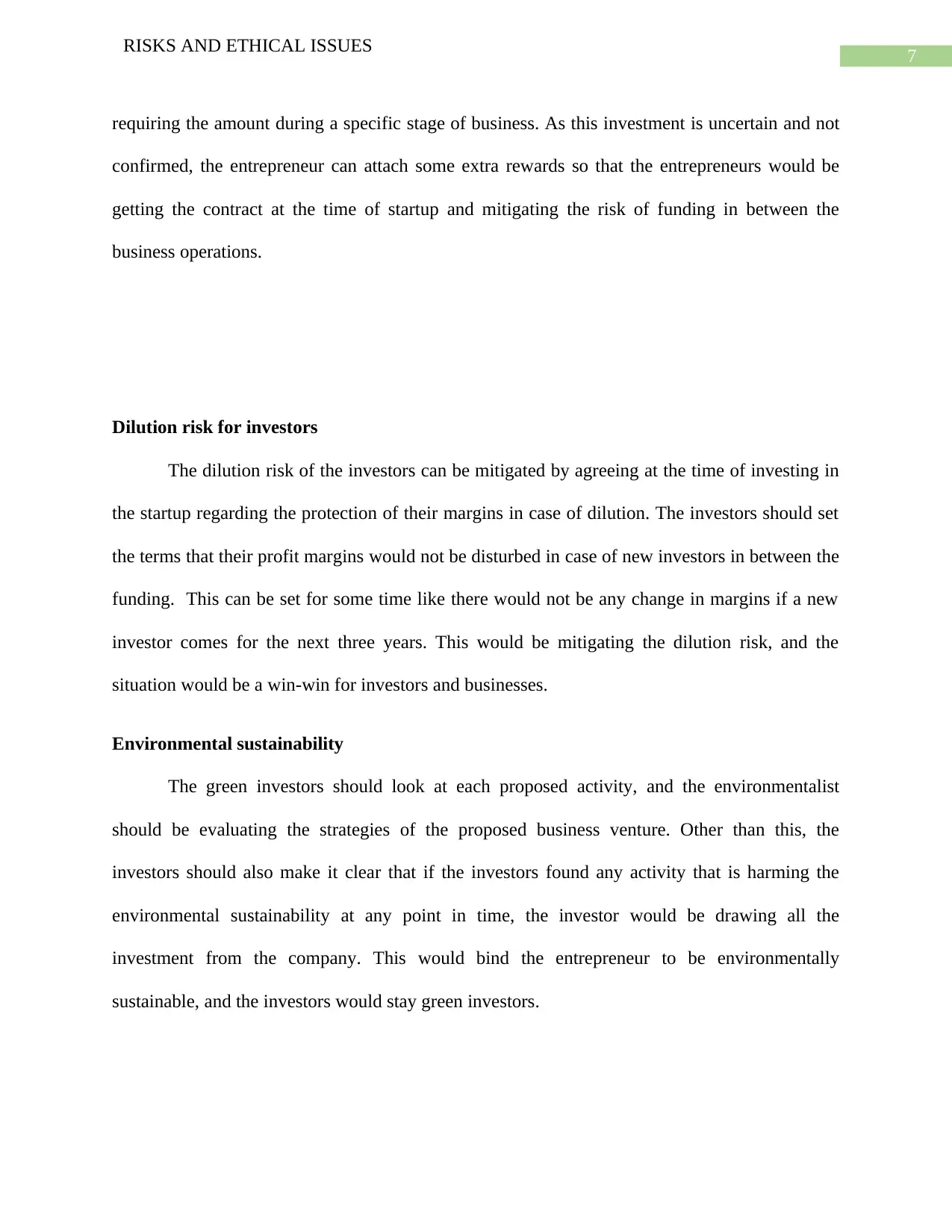
7
RISKS AND ETHICAL ISSUES
requiring the amount during a specific stage of business. As this investment is uncertain and not
confirmed, the entrepreneur can attach some extra rewards so that the entrepreneurs would be
getting the contract at the time of startup and mitigating the risk of funding in between the
business operations.
Dilution risk for investors
The dilution risk of the investors can be mitigated by agreeing at the time of investing in
the startup regarding the protection of their margins in case of dilution. The investors should set
the terms that their profit margins would not be disturbed in case of new investors in between the
funding. This can be set for some time like there would not be any change in margins if a new
investor comes for the next three years. This would be mitigating the dilution risk, and the
situation would be a win-win for investors and businesses.
Environmental sustainability
The green investors should look at each proposed activity, and the environmentalist
should be evaluating the strategies of the proposed business venture. Other than this, the
investors should also make it clear that if the investors found any activity that is harming the
environmental sustainability at any point in time, the investor would be drawing all the
investment from the company. This would bind the entrepreneur to be environmentally
sustainable, and the investors would stay green investors.
RISKS AND ETHICAL ISSUES
requiring the amount during a specific stage of business. As this investment is uncertain and not
confirmed, the entrepreneur can attach some extra rewards so that the entrepreneurs would be
getting the contract at the time of startup and mitigating the risk of funding in between the
business operations.
Dilution risk for investors
The dilution risk of the investors can be mitigated by agreeing at the time of investing in
the startup regarding the protection of their margins in case of dilution. The investors should set
the terms that their profit margins would not be disturbed in case of new investors in between the
funding. This can be set for some time like there would not be any change in margins if a new
investor comes for the next three years. This would be mitigating the dilution risk, and the
situation would be a win-win for investors and businesses.
Environmental sustainability
The green investors should look at each proposed activity, and the environmentalist
should be evaluating the strategies of the proposed business venture. Other than this, the
investors should also make it clear that if the investors found any activity that is harming the
environmental sustainability at any point in time, the investor would be drawing all the
investment from the company. This would bind the entrepreneur to be environmentally
sustainable, and the investors would stay green investors.
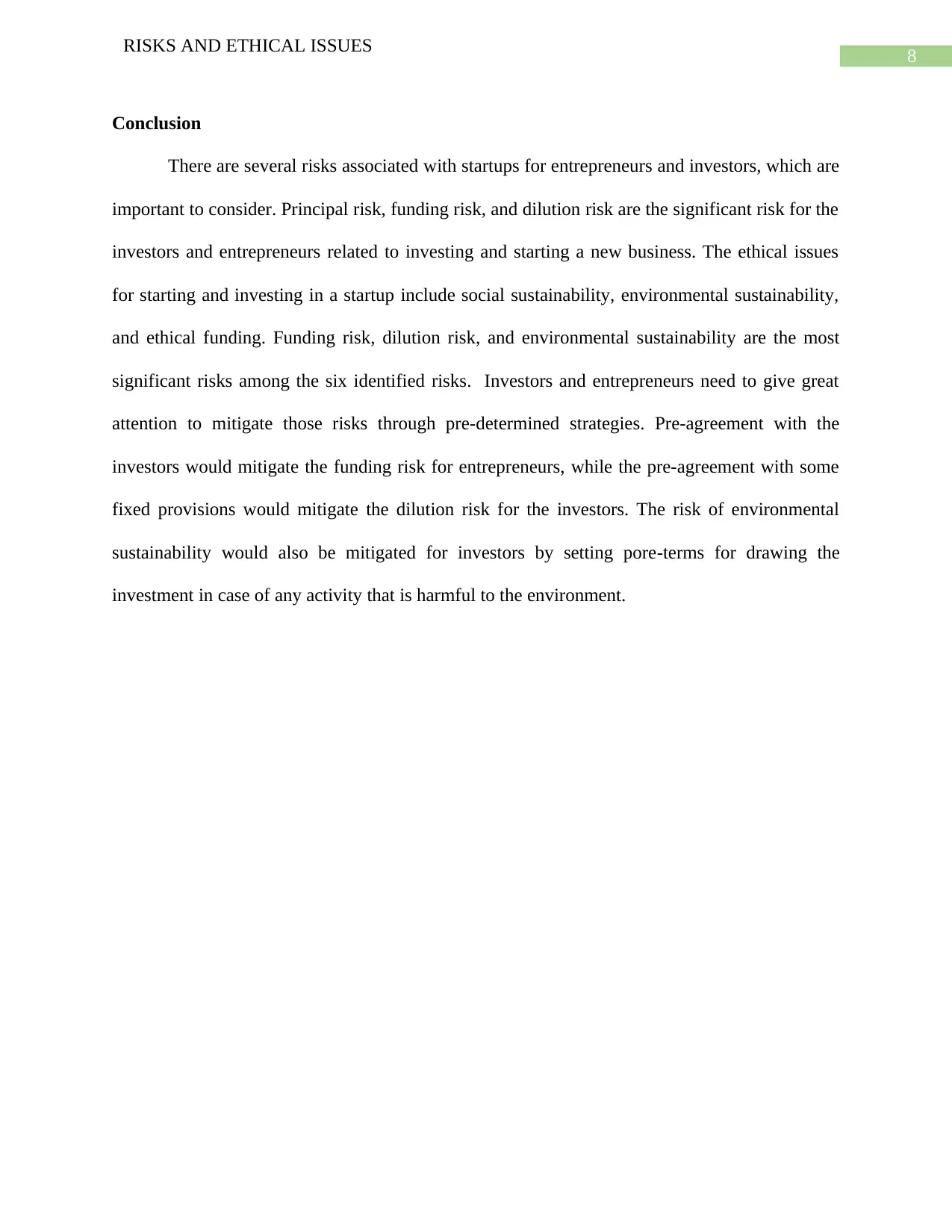
8
RISKS AND ETHICAL ISSUES
Conclusion
There are several risks associated with startups for entrepreneurs and investors, which are
important to consider. Principal risk, funding risk, and dilution risk are the significant risk for the
investors and entrepreneurs related to investing and starting a new business. The ethical issues
for starting and investing in a startup include social sustainability, environmental sustainability,
and ethical funding. Funding risk, dilution risk, and environmental sustainability are the most
significant risks among the six identified risks. Investors and entrepreneurs need to give great
attention to mitigate those risks through pre-determined strategies. Pre-agreement with the
investors would mitigate the funding risk for entrepreneurs, while the pre-agreement with some
fixed provisions would mitigate the dilution risk for the investors. The risk of environmental
sustainability would also be mitigated for investors by setting pore-terms for drawing the
investment in case of any activity that is harmful to the environment.
RISKS AND ETHICAL ISSUES
Conclusion
There are several risks associated with startups for entrepreneurs and investors, which are
important to consider. Principal risk, funding risk, and dilution risk are the significant risk for the
investors and entrepreneurs related to investing and starting a new business. The ethical issues
for starting and investing in a startup include social sustainability, environmental sustainability,
and ethical funding. Funding risk, dilution risk, and environmental sustainability are the most
significant risks among the six identified risks. Investors and entrepreneurs need to give great
attention to mitigate those risks through pre-determined strategies. Pre-agreement with the
investors would mitigate the funding risk for entrepreneurs, while the pre-agreement with some
fixed provisions would mitigate the dilution risk for the investors. The risk of environmental
sustainability would also be mitigated for investors by setting pore-terms for drawing the
investment in case of any activity that is harmful to the environment.
⊘ This is a preview!⊘
Do you want full access?
Subscribe today to unlock all pages.

Trusted by 1+ million students worldwide
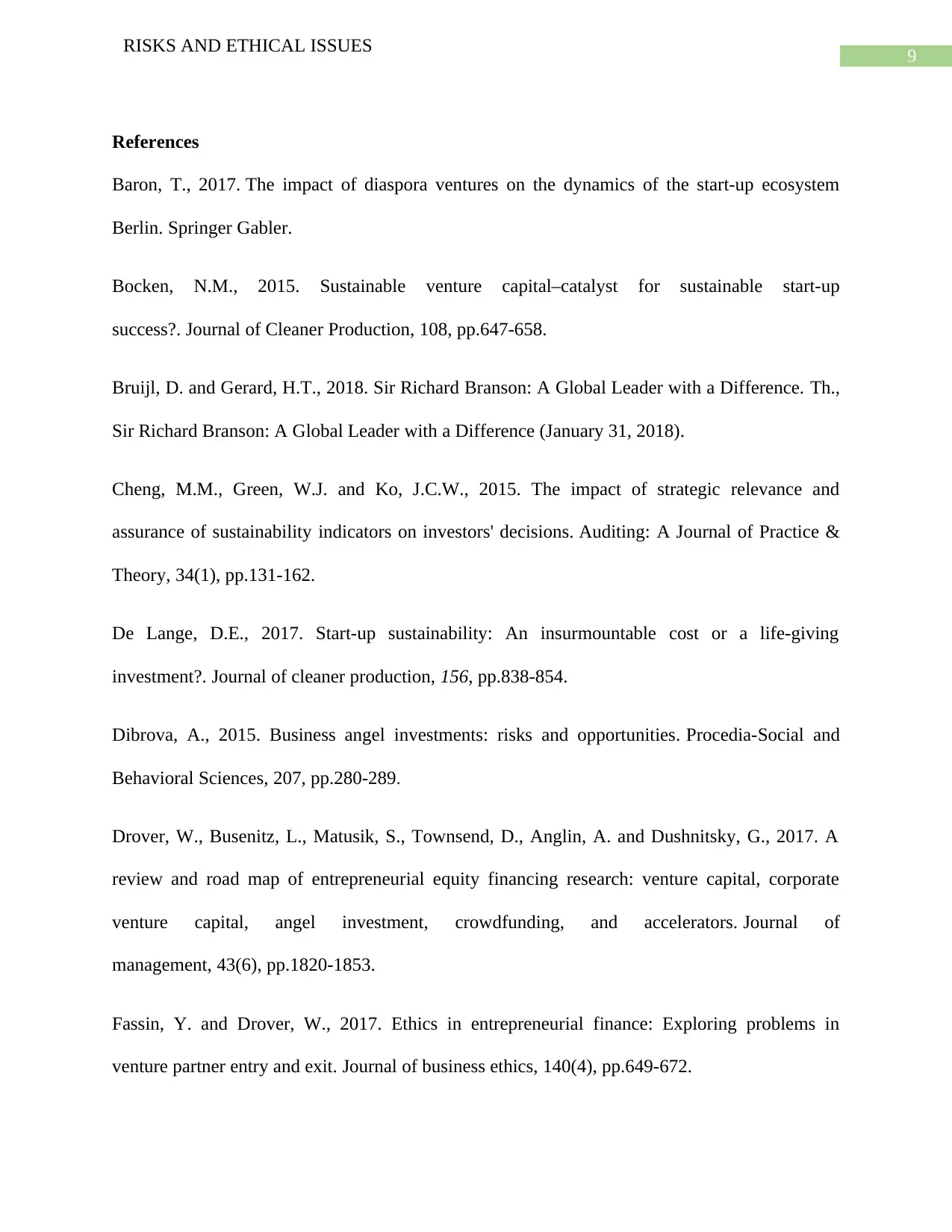
9
RISKS AND ETHICAL ISSUES
References
Baron, T., 2017. The impact of diaspora ventures on the dynamics of the start-up ecosystem
Berlin. Springer Gabler.
Bocken, N.M., 2015. Sustainable venture capital–catalyst for sustainable start-up
success?. Journal of Cleaner Production, 108, pp.647-658.
Bruijl, D. and Gerard, H.T., 2018. Sir Richard Branson: A Global Leader with a Difference. Th.,
Sir Richard Branson: A Global Leader with a Difference (January 31, 2018).
Cheng, M.M., Green, W.J. and Ko, J.C.W., 2015. The impact of strategic relevance and
assurance of sustainability indicators on investors' decisions. Auditing: A Journal of Practice &
Theory, 34(1), pp.131-162.
De Lange, D.E., 2017. Start-up sustainability: An insurmountable cost or a life-giving
investment?. Journal of cleaner production, 156, pp.838-854.
Dibrova, A., 2015. Business angel investments: risks and opportunities. Procedia-Social and
Behavioral Sciences, 207, pp.280-289.
Drover, W., Busenitz, L., Matusik, S., Townsend, D., Anglin, A. and Dushnitsky, G., 2017. A
review and road map of entrepreneurial equity financing research: venture capital, corporate
venture capital, angel investment, crowdfunding, and accelerators. Journal of
management, 43(6), pp.1820-1853.
Fassin, Y. and Drover, W., 2017. Ethics in entrepreneurial finance: Exploring problems in
venture partner entry and exit. Journal of business ethics, 140(4), pp.649-672.
RISKS AND ETHICAL ISSUES
References
Baron, T., 2017. The impact of diaspora ventures on the dynamics of the start-up ecosystem
Berlin. Springer Gabler.
Bocken, N.M., 2015. Sustainable venture capital–catalyst for sustainable start-up
success?. Journal of Cleaner Production, 108, pp.647-658.
Bruijl, D. and Gerard, H.T., 2018. Sir Richard Branson: A Global Leader with a Difference. Th.,
Sir Richard Branson: A Global Leader with a Difference (January 31, 2018).
Cheng, M.M., Green, W.J. and Ko, J.C.W., 2015. The impact of strategic relevance and
assurance of sustainability indicators on investors' decisions. Auditing: A Journal of Practice &
Theory, 34(1), pp.131-162.
De Lange, D.E., 2017. Start-up sustainability: An insurmountable cost or a life-giving
investment?. Journal of cleaner production, 156, pp.838-854.
Dibrova, A., 2015. Business angel investments: risks and opportunities. Procedia-Social and
Behavioral Sciences, 207, pp.280-289.
Drover, W., Busenitz, L., Matusik, S., Townsend, D., Anglin, A. and Dushnitsky, G., 2017. A
review and road map of entrepreneurial equity financing research: venture capital, corporate
venture capital, angel investment, crowdfunding, and accelerators. Journal of
management, 43(6), pp.1820-1853.
Fassin, Y. and Drover, W., 2017. Ethics in entrepreneurial finance: Exploring problems in
venture partner entry and exit. Journal of business ethics, 140(4), pp.649-672.
Paraphrase This Document
Need a fresh take? Get an instant paraphrase of this document with our AI Paraphraser
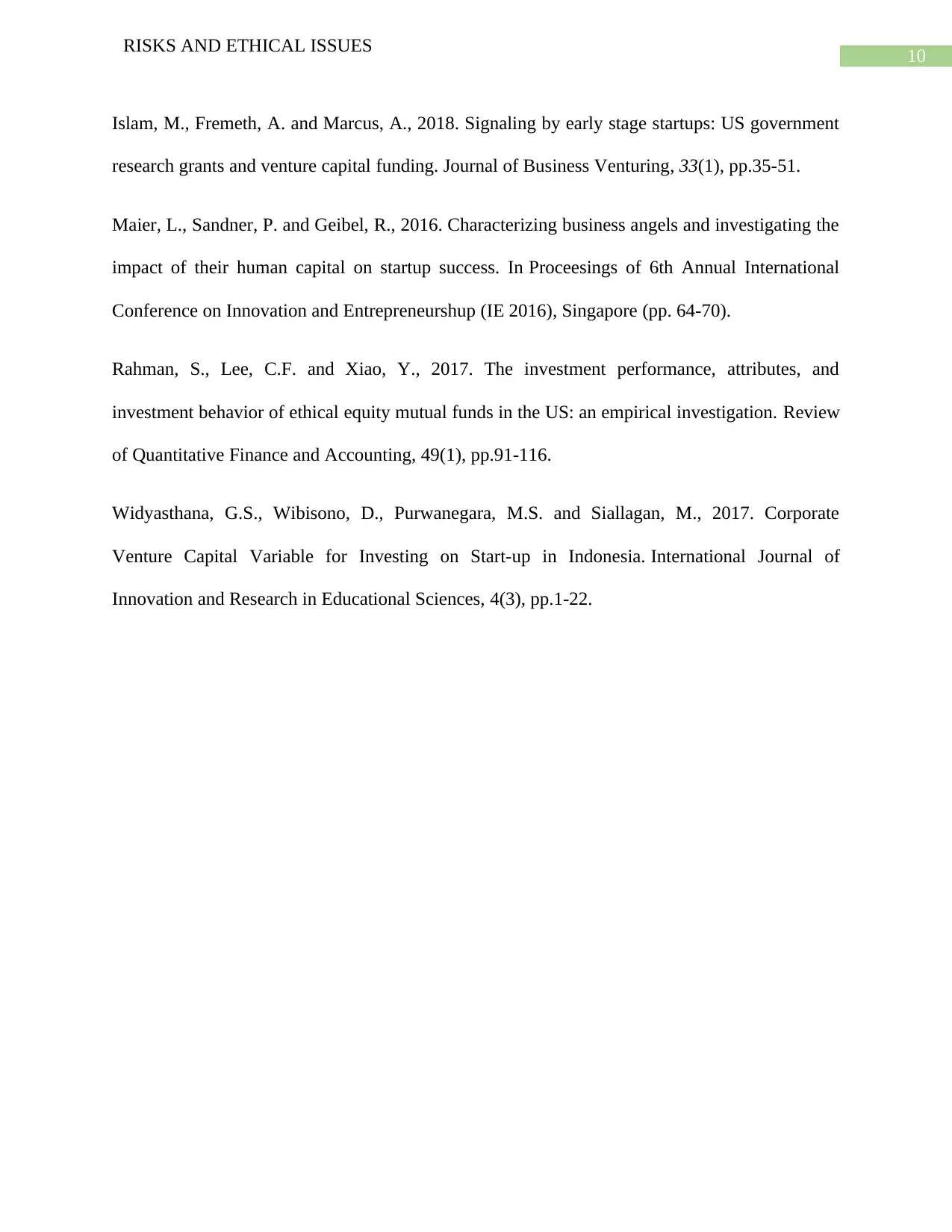
10
RISKS AND ETHICAL ISSUES
Islam, M., Fremeth, A. and Marcus, A., 2018. Signaling by early stage startups: US government
research grants and venture capital funding. Journal of Business Venturing, 33(1), pp.35-51.
Maier, L., Sandner, P. and Geibel, R., 2016. Characterizing business angels and investigating the
impact of their human capital on startup success. In Proceesings of 6th Annual International
Conference on Innovation and Entrepreneurshup (IE 2016), Singapore (pp. 64-70).
Rahman, S., Lee, C.F. and Xiao, Y., 2017. The investment performance, attributes, and
investment behavior of ethical equity mutual funds in the US: an empirical investigation. Review
of Quantitative Finance and Accounting, 49(1), pp.91-116.
Widyasthana, G.S., Wibisono, D., Purwanegara, M.S. and Siallagan, M., 2017. Corporate
Venture Capital Variable for Investing on Start-up in Indonesia. International Journal of
Innovation and Research in Educational Sciences, 4(3), pp.1-22.
RISKS AND ETHICAL ISSUES
Islam, M., Fremeth, A. and Marcus, A., 2018. Signaling by early stage startups: US government
research grants and venture capital funding. Journal of Business Venturing, 33(1), pp.35-51.
Maier, L., Sandner, P. and Geibel, R., 2016. Characterizing business angels and investigating the
impact of their human capital on startup success. In Proceesings of 6th Annual International
Conference on Innovation and Entrepreneurshup (IE 2016), Singapore (pp. 64-70).
Rahman, S., Lee, C.F. and Xiao, Y., 2017. The investment performance, attributes, and
investment behavior of ethical equity mutual funds in the US: an empirical investigation. Review
of Quantitative Finance and Accounting, 49(1), pp.91-116.
Widyasthana, G.S., Wibisono, D., Purwanegara, M.S. and Siallagan, M., 2017. Corporate
Venture Capital Variable for Investing on Start-up in Indonesia. International Journal of
Innovation and Research in Educational Sciences, 4(3), pp.1-22.

11
RISKS AND ETHICAL ISSUES
RISKS AND ETHICAL ISSUES
⊘ This is a preview!⊘
Do you want full access?
Subscribe today to unlock all pages.

Trusted by 1+ million students worldwide
1 out of 12
Related Documents
Your All-in-One AI-Powered Toolkit for Academic Success.
+13062052269
info@desklib.com
Available 24*7 on WhatsApp / Email
![[object Object]](/_next/static/media/star-bottom.7253800d.svg)
Unlock your academic potential
Copyright © 2020–2026 A2Z Services. All Rights Reserved. Developed and managed by ZUCOL.





